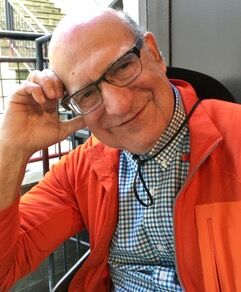September 2, 2020
A Tribute to Chuck Bosk
By our department’s Steven Joffe, based on a tribute written by Joanna Kempner, Rutgers, and Betsy Armstrong, Princeton
Dear colleagues,
I’m writing to share the sad news that Chuck Bosk died suddenly this past Sunday, and to offer a few reflections on him and his career. Chuck, a longtime member of Penn’s bioethics community, was an influential sociologist whose work on medical education, medical errors and patient safety, the medical profession, bioethics and the ethics of social science research, and social problems was both foundational within the field of medical sociology and resonated within clinical medicine, health policy, and bioethics. His contributions span fine-grained, closely observed ethnography and richly reasoned, elegantly argued theory. His wide-ranging influence in sociology, in medicine, and in bioethics was apparent in his appointments as a visiting professor at numerous medical schools, including Johns Hopkins, and as a fellow at the Hastings Center for Bioethics.
After earning a BA at Wesleyan, Chuck completed a PhD at the University of Chicago, becoming a leading member of what is sometimes characterized as the “Third School” of Chicago sociology. He was a gifted teacher who made a deep imprint on generations of undergraduate and graduate students at Penn, where he had taught since 1976, with appointments in Sociology, the Center for Bioethics, and the School of Medicine. He won multiple awards within sociology and was elected to the Institute of Medicine at the National Academy of Sciences in 2013.
Chuck was one of those rare sociologists who managed to influence medical culture, which in turn, made hospitals safer places to be. He was an astute observer of specialized worlds, with a knack for questioning widely-accepted authoritative knowledge. His first (and classic) book, Forgive and Remember: Managing Medical Failure (University of Chicago Press, 1st edition 1979; 2nd expanded edition, 2003), provided an ethnographic account of how attending physicians dealt with the inevitable mistakes made by surgeons-in-training. His incisive analysis not only became deeply influential within sociology, but in the medical profession as well. The book has been a bestseller in medical school bookstores since its publication; generations of surgical residents have turned to the book to make sense of their own experiences. His second book, All God’s Mistakes: Genetic Counseling in a Pediatric Hospital (University of Chicago Press, 1992) explored the emerging field of prenatal genetic counseling. Most recently, he was working on how hospitals might improve safety by addressing the culture in which healthcare providers work, rather than relying on technological solutions like checklists. He was an authoritative voice in both academic and policy debates about patient safety and quality improvement, publishing widely within the medical literature and serving on multiple task forces, including at the Agency for Healthcare Research and Quality, the Hastings Center for Bioethics, and the Children’s Hospital of Philadelphia.
Chuck was a deeply reflective scholar and his own experience with ethnography in ethically fraught medical settings propelled his scholarly attention to the ethics of social science research. He published two books on the ethical complexity of research, The View from Here: Social Science and Bioethics (Blackwell Publishers, 2007), co-edited with Raymond DeVries, Kristina Orfali, and Leigh Turner, and What Would You Do? Juggling Bioethics and Ethnography (University of Chicago Press, 2008).
Chuck was beloved and respected by his students and colleagues. Renee Fox, who first brought him to Penn, wrote, “I'm very proud that we were able to recruit him so soon after he had completed his graduate training at the University of Chicago. What might also be emphasized was that Chuck was a pioneer both in the field of medical sociology and of bioethics; that he was a brilliant, lifelong ethnographer; that he was attuned to existential as well as social and cultural issues relevant to health, illness, and medicine (e.g. ‘forgive and remember,’ ‘managing medical error’); and that he dealt with both what he thought were the virtues of medicine, and its shortcomings.” Art Caplan wrote that: “He was a curmudgeon but of the best kind -- high standards, took his job seriously, eager to work with others, careful scholar, and a wonderful dry sense of humor.” Jonathan Moreno said: “He was the model of how a mainly qualitative social scientist can have an enormous impact on a culture, in his case medical education. Brilliant observer of small group systems.” And Dominic Sisti wrote, “Chuck’s MBE course changed the way I thought about not just medicine and bioethics, but social and political institutions more broadly. I loved seeing him and catching up with him at the Belmont Hills pool, where he was so happy to be playing with his grandkids.”
